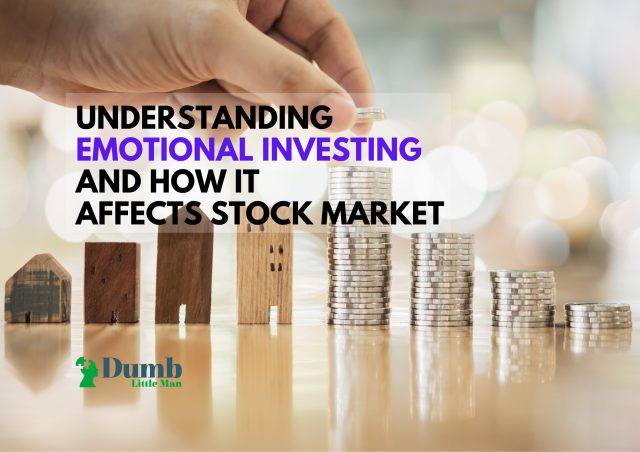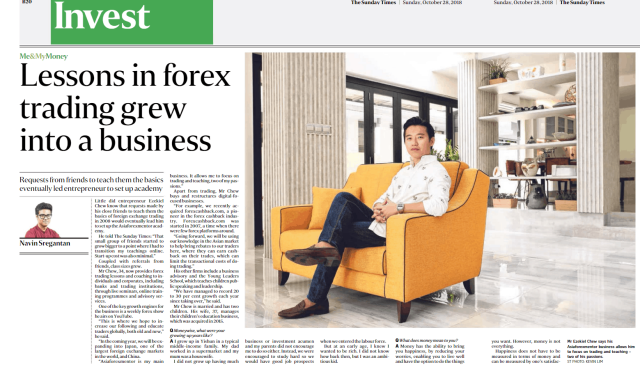What Is Emotional Investing And How To Overcome it 2025
By Jordan Blake
January 5, 2025 • Fact checked by Dumb Little Man

Want to jump straight to the answer? The best stock brokers for traders are Tradestation and Tradier
The #1 Stock and Forex Trading Course is Asia Forex Mentor
Emotional investing is a term used to describe the phenomenon of making investment decisions based on emotions rather than logic. Unfortunately, many investors fall prey to this type of thinking, and it can often lead to suboptimal outcomes. Also, emotions that are out of control can lead to the investors' portfolio losses.
When the stock market is going up, it is easy to get caught up in the euphoria and start investing without thinking about the risks. But unfortunately, it happens at the top of a market cycle, leading investors to buy overvalued assets and take on too much risk.
Conversely, when the market is going down, it is easy to get caught up in the fear and start selling assets without thinking about the long-term implications. Unfortunately, this mostly happens at the bottom of a market cycle, leading to investors selling undervalued assets and missing out on the potential upside.
However, turning off or ignoring these instincts is next to impossible. The best investors can do is to be aware of them and ensure they don't influence investment decisions. To understand the emotional investment and how to deal with it, we've got Ezekiel Chew to share his take on the matter. He is the founder and CEO of Asia's Largest Online Stock and Forex Education provider, Asia Forex Mentor.
In this guide, we will discuss emotional investing, how to avoid it, and the important things to consider before you make any investment.
What is Emotional Investing

Emotional investing is when you make investment decisions based on your behaviors, emotions, and feelings instead of logic. However, emotional spending and investment are not the same.
Emotional spending is when you spend money on things you want but do not need. For example, buying a new car just because you feel like it or going on an extravagant vacation that you cannot afford.
According to a report, 66% of investors regret emotional investment decisions. They know they should not allow their emotions to control or influence their investment decisions, but they cannot help.
7 Steps to Avoid Emotional Decisions in Investments
Well, it is not always about money. When it comes to accomplishing something great, controlling emotions becomes mandatory. Below are the seven crucial steps to avoid emotional investing decisions while investing:
#1. Focus On Long-Term Goals

Managing your emotions and making rational decisions is important when investing. However, not being able to control your emotions also means you cannot focus on the long-term plans of your investment.
You must learn to separate your emotions and make rational decisions to solve this issue. Focus on all the factors that are out of line with what you want and need. Always ask questions to understand if your goals are changed or are the same. You need to analyze if there are any noticeable changes in your life.
Determine your investment approach and stick to it. You can start by creating an outline for your investing goals. Next, schedule an ideal capital allocation. After that, you should also describe your study approach and all of the characteristics you would need to detect in a scenario for it to be feasible. Moreover, keep track of all those traits with time and modify your strategy and goals when required.
Moreover, you should also focus on the bad days and not let your emotions get the best of you. Ignore the short-term losses and concentrate on the long-term goals as the market keeps bouncing and drifting.
#2. Study Market Emotions

You must also know how to read the market with a sharp eye and focus. If you don't know where the major breaks in the market are, then you cannot make any decisions.
Remember that some emotions will always be out of control in the markets. Understand them and then learn how to control your emotions and risk tolerance. Don't just react to market emotions, but take action by looking at others who have similar traits and projects as yours. By this, you will know how to change your emotions and the way you invest.
Focus on your goals, timeframe, risk management, and entry & exits. Emotions should be the last thing on your mind while making an investment decision.
#3. Keep Everything in Loop

You should also be aware that some investors are always in the loop of the market. Oftentimes, they know what is going on in the market and let their emotions control them. They may have huge amounts of money but fail to make investments because they don't know what to do with it
You need time to study, analyze, understand and compare your investment options before you decide on anything. Doing this will teach you how to keep your emotions out of control as much as possible. Also, staying in the loop allows you to adjust your emotions and make the right decision at the right time.
There are several tools to help you make the right decisions. However, market dips must be viewed in the context of seasonal trends. We also recommend speaking with experts who have experience in the area of your interest, especially if it's a new subject for you.
#4. A Comprehensive Business Plan

Unlike cold investments, you need to study the business plan before making any investment. Also, you should know how the business is doing financially.
For example, if the company is doing well financially, there is a chance for another expansion or IPO. Therefore, don't make any investment without studying the financial reports of the company in question.
Ask yourself this question to avoid emotional decisions: If this investment fails, then would I be able to recover quickly? If yes, then go ahead and invest.
#5. Don't Obsess Over Your Investments

Investors who obsess over their investments are more likely to make irrational decisions. This is because they become emotionally attached to their investments and can't think objectively.
The key is to diversify your portfolio so that you don't have all your eggs in one basket. Doing this will make you less likely to obsess over any investment.
#6. Be Cautious

Assessing the implementation possibility is an important analytical element in understanding the effects of government debt, interest rates, and the economy. Nevertheless, this implementation possibility has a wide range of outcomes that make it hard to judge what exactly is going on. The best way to be cautious about this is by observing the market and carefully analyzing the data.
This will help you understand how people react to different events and give you an idea about future trends. You can make well-informed investment decisions and avoid emotional ones by being cautious.
#7. Hire A Registered Investment Advisor

If you are already in the process of investing and have professional financial advice, then you can ask them to help you with your emotional investing.
Financial advisors are experts and know how to read the market for investments that suit your needs. Moreover, they are also knowledgeable about taxes and other regulations so that they can guide you on how you can save money.
Some expert advisors can also create customizable investment portfolios for you, so you don't have to worry about anything. You need to provide them with your financial goals, and they will take care of the rest.
Hiring a registered investment advisor is one of the best ways to avoid emotional investment. This is because they will help you stay disciplined and focused on your long-term goals.
Things to Consider Before Investing

Below are a few of the things you must consider before investing:
Volatility Is Not a Bad Thing If You Know It
Most people think that volatility is synonymous with risk. However, this is not always the case. Volatility measures the number of fluctuations in an asset's price.
It is important to remember that all investments are subject to some degree of market volatility. Investing in assets you are comfortable with and understanding the risks involved is key.
Negative Investor Emotions Are Never Good
When it comes to investments, it is important to keep your emotions in check. This is because emotions can cloud your judgment and lead to impulsive decisions.
The key is to have a clear investment strategy and stick to it. This will help you stay disciplined and avoid making any rash decisions.
Beware Of Scammers
There are many scammers out there who are looking to take advantage of investors. They will often promise high returns with little or no risk.
However, these claims are usually too good to be true. Therefore, it is important to be cautious of such offers and do your research before investing. Investing with a reputable and regulated mutual funds company with excellent past performance is the best way to avoid scams. This will help you protect your money and avoid any losses.
Moreover, it would help if you also had a clear exit strategy for all your investments. This will help you take profits right and cut your losses when required.
Best Stock and Forex Trading Course

Asia Forex Mentor offers the best forex trading education in Asia. The course is set up so that you can earn money while learning. You'll be able to trade forex profitably with a skilled trader's help. In Singapore and other sites worldwide, tens of thousands of people from the United States, the United Kingdom, and other Asian countries have been taught.
Ezekiel Chew's teaching method is founded on the principle of return on investment, which states that if you invest $1, you will gain $3. It's not about zany strategies or elaborate procedures. Professional traders and financial organizations use his authorized system. He is the driving force behind the growth of various companies, including DBP, the Philippines' second-largest state-owned corporation.
Due to his strategy's effectiveness, many full-time traders have joined the program with little to no prior trading experience and emerged successful.
| RECOMMENDED TRADING COURSE | REVIEW | VISIT |
|---|---|---|
 | #1 Forex, Crypto and Stocks trading course. Ranked most comprehensive by Investopedia and Best by Benzinga. Free to Try! |  |
Best Stock Brokers
| Broker | Best For | More Details |
|---|---|---|
 | Advanced Traders Read Review | securely through Tradestation website |
 | Intuitive Platforms Read Review | securely through Tradier website |
 | Powerful Services at a Low Cost | securely through Tradezero website |
 | Professional Forex Traders Read Review | securely through Interactive Brokers website |
Conclusion: Emotional Investing

Many investors mistake allowing their emotions to control their investment decisions. Unfortunately, this can lead to impulsive decisions affecting your financial health. Therefore, it is important to be aware of your emotions and learn to control them.
Fear, greed, and hope are the most common emotions that can lead to bad investment decisions. These emotions can cause you to make irrational decisions that can be detrimental to your financial health. Therefore, it is important to be aware of these emotions and learn to control them.
Emotional Investing FAQs
What are Emotional Biasedness in the Stock Market?
Emotional biasedness is when investors let their emotions guide their investment decisions. This can lead to impulsive and irrational decision-making, detrimental to their financial health.
How do I stop emotionally Investing in the financial markets?
Start with creating a self-investment plan and following it without fail. Review your plan often to ensure that your investments are still on track to help you reach your goals. Next, make your diversified portfolio and invest for the long term financial goals. Next, have an exit strategy for all investments and stick to it. Lastly, be aware of your emotions and learn to control them.
Jordan Blake
Jordan Blake is a cultural commentator and trending news writer with a flair for connecting viral moments to the bigger social picture. With a background in journalism and media studies, Jordan writes timely, thought-provoking content on everything from internet challenges and influencer scandals to viral activism and Gen Z trends. His tone is witty, observant, and sharp—cutting through the noise to bring readers the “why” behind the “what.” Jordan’s stories often go deeper than headlines, drawing links to pop culture, identity, and digital behavior. He’s contributed to online media hubs and social commentary blogs and occasionally moderates online panels on media literacy. When he’s not chasing the next big trend, Jordan is probably making memes or deep-diving into Reddit threads. He believes today’s trends are tomorrow’s cultural history—and loves helping readers make sense of it all.













